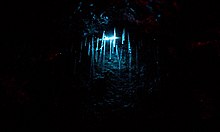glowworm
Appearance
See also: glow-worm
English
[edit]

Alternative forms
[edit]Etymology
[edit]From Middle English glouworm; equivalent to glow + worm.
Noun
[edit]glowworm (plural glowworms)
- The larva or wingless grub-like female of a beetle from the families Phengodidae or Lampyridae that gives out a green light from its abdomen.
- c. 1599–1602 (date written), William Shakespeare, “The Tragedie of Hamlet, Prince of Denmarke”, in Mr. William Shakespeares Comedies, Histories, & Tragedies […] (First Folio), London: […] Isaac Iaggard, and Ed[ward] Blount, published 1623, →OCLC, [Act I, scene v]:
- The glowworm shows the matin to be near
And ’gins to pale his uneffectual fire.
Adieu, adieu, adieu! Remember me.
- 1604, William Alexander, The Alexandraean Tragedie, Act V, Scene 2, in The Monarchicke Tragedies, London: Ed. Blount, 1607,[1]
- Some things afarre doe like the Glow-worme shine,
- That lookt to neere haue of that light no signe.
- 1612–1613 (date written), John Webster, The Tragedy of the Dutchesse of Malfy. […], London: […] Nicholas Okes, for Iohn Waterson, […], published 1623, →OCLC, (please specify the page):
- Glories (like glowe-wormes) a farre off, shine bright,
But look’d to neere, haue neither heate, nor light.
- 1681, Andrew Marvell, “The Mower to the Glo-Worms”, in Miscellaneous Poems[2], London: Robert Boulter, page 44:
- Ye Glo-worms, whose officious Flame
To wandring Mowers shows the way,
That in the Night have lost their aim,
And after foolish Fires do stray;
- 1819, William Wordsworth, “The Waggoner” Canto 1, in The Miscellaneous Poems of William Wordsworth, London: Longman, Hurst, Rees, Orme & Brown, 1820, p. 7,[3]
- Confiding Glow-worms, ’tis a night
- Propitious to your earth-born light!
- 1954, Dylan Thomas, Under Milk Wood […] [4], New York: New Directions, page 1:
- Young girls lie bedded soft or glide in their dreams, with rings and trousseaux, bridesmaided by glowworms down the aisles of the organplaying wood.
- (Australia, New Zealand) A carnivorous gnat larva in the keroplatid genus Arachnocampa that spins threads to capture insects attracted by its glow.
Derived terms
[edit]Translations
[edit]beetle larva or female
|
